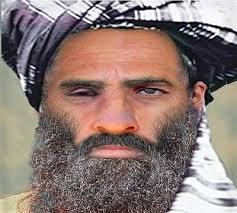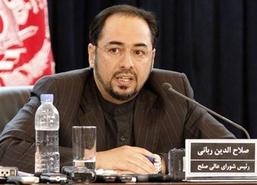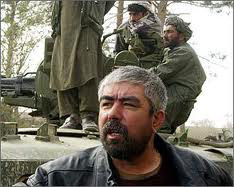Mullah Omar
There has been much speculation as to the whereabouts of Taliban chief Mullah Omar and even whether the reclusive leader (who has not been seen in public since 2001) is alive. A Taliban splinter group called Fidai Mahaz, loosely translated as Fanatic Front, issued a statement claiming that Mullah Omar is indeed dead. The group's spokesman, Qari Hamza, said that Mullah Omar was killed in July 2013 by his two lieutenants Mullah Akhtar Mansoor and Gul Agha. He did not reveal why and how Omar was killed, but indicated that they have evidence to prove their claim as reported by Khaama Press on Thursday July 23rd. Incidentally the Fidai Mahaz was created by a number of Taliban as a protest over the talks in Qatar between the US and the Taliban in 2013. The Afghan intelligence agency, the National Directorate for Security (NDS), had indicated in November 2014 that Mullah Omar had possibly been killed, but the statement did not go beyond speculation.
Regardless of whether Mullah Omar is indeed dead, the pronouncement of his demise by the splinter group could be a sign of serious turmoil within the ranks of the Taliban. A statement in the name of Mullah Omar was recently issued in which he gave the Taliban permission to sit with the Afghan government in face to face talks. The next round of talks be held soon in China. The Afghan delegation which will include a female member shall press the Taliban for a cease fire during the talks. Since the beginning of this year's fighting season in April, the Taliban have significantly increased their operations with suicide bombings, raids on police and military checkpoints throughout the country. Their brazenness has put the Afghan National Security Forces (ANSF) in a new light, exposing ANSF's serious vulnerabilities and shortcomings.
By demanding that the Taliban agree to a cease fire, the Afghan government aims to gauge whether the Taliban are serious about an eventual political reconciliation. But the fact the Taliban are divided, some favoring talks while others such as Fidai Mahaz vehemently opposing them makes any ceasefire impossible as the classic Taliban leadership no longer controls the splinter groups. In fact, Fidai Mahaz took responsibility for the assassination of former Logar province governor Arsala Jamal. Based on their pronouncements against India, there is an indication that Fidai Mahaz is close to the Pakistani intelligence organization, the ISI. If this is indeed the case, the plot thickens and it clearly shows that Pakistan continues trying to have a surprise card to play in the Afghanistan game.
For the next round of negotiations the Taliban delegation will be headed by Mullah Akhtar Mansoor, whom Fidai Mahaz has implicated in killing Mullah Omar. If true, he has, therefore, either assumed Omar's position or is leading the Taliban with other commanders who are in favor of direct negotiations with the Afghan government. It remains to be seen as to who will be the Afghan government's team. The team during the first round in Islamabad a few weeks ago was led by deputy foreign minister Hekmat Karzai, a cousin of the former Afghan president Hamid Karzai. The appointment of Hekmat Karzai (a former bar bouncer in Virginia before going back to Afghanistan after 2001) to the sensitive post of deputy foreign minister raised some eyebrows among Afghans. What he brings to the negotiating table in terms of credibility and competence is an open question.
Meanwhile a number of high ranking officials in the Afghan Unity Government are concerned about the Taliban's increased level of activities especially in the northern parts of the country, home to the Northern Alliance. The Afghan foreign minister, Salahudin Rabbani, favors an active role for the former Mujahedeen warlords in combating the Taliban. Mr. Rabbani, who as the head of the High Peace Council I advised in 2012, asserts that the former warlords have invaluable combat experience. Mr. Rabbani is a forward thinking and educated man with degrees from Britain and the US (Columbia University). I was surprised to hear his latest views. The Afghan first vice president, Rasheed Dostom, a former bandit and warlord also advocates the use of former militias in the clearing operation of Faryab, his home province in the north. How these militias will successfully counter the Taliban gains is not clear based on their past performance. The Taliban very easily chased these warlords out of the country and disarmed their thuggish militias in the mid 1990's. Empowering the warlords is inversely proportional to the stability of Afghanistan, a dangerous move further widening the tribal and ethnic divides. But that is how the warlords thrive, divide and conquer.
Foreign Minister Rabbani left and Vice President Dostom right
Whether Mullah Omar is dead or alive may not be that significant in itself, but if he is alive and in favor of talks, he needs to permanently come out of hibernation and show that he is relevant. If Mullah Mansoor or someone else is in charge that needs to be made known. But at same time, keeping the cards close to their chest might be in their advantage in wearing down the Afghan government.



